I found a mushroom egg.
Yes, that’s a thing!

Finding of the egg:
It was growing in a grassy area in a hardwood forest. It really looked like someone left an egg in the middle of the forest, and that caught my eye.
At that point there were only a few possible options since I only know of three main types of mushrooms that start as an egg: Amanitas, Volvariellas, and Stinkhorns.
When I touched it, it felt soft, which narrowed my options to a Stinkhorn. Stinkhorn eggs are soft and if you cut them in half you can actually see the profile of the mature fruiting body, but most likely, you won't be able to see all the features needed to identify it down to the species name.
I really wanted to know what it was, so I took it home to hatch it.
Hatching the egg:
For some species of mushrooms, you can actually take the egg off the ground and hatch it by keeping it in a moist environment, which in my case was a polypropylene container filled with wet debris and leaves and covered with plastic film.
First observation, the immature fruiting body (the "egg") was whitish colored and about 7 cm tall by 5 cm wide.
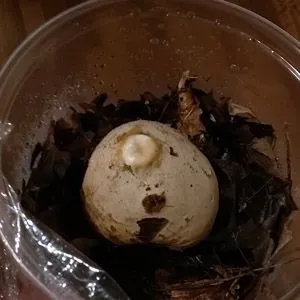
The egg didn’t change much during the next 24 hours. It got darker and softer, but I assumed it was rotting and I was not going to get it to hatch.
But the second night after I picked it, the top of the egg changed color and started to look like the ovomorphs from the movie Alien.
It seemed this egg was about to hatch!
Mushroom Identification:
When I woke up the next day, I went to take a picture and this is what I found.
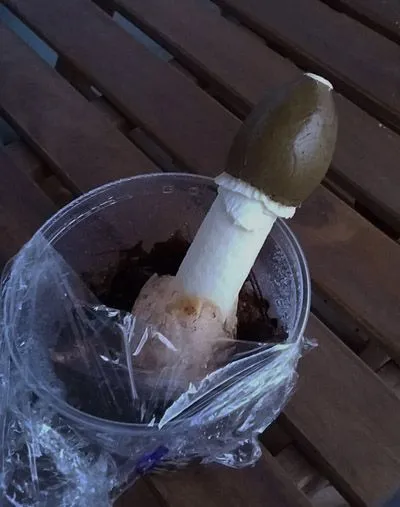
Now we can start with the identification game.
This fungus was growing on some forest debris, so it was clearly saprobic.
I also discovered what was causing the creepy tip on the egg.
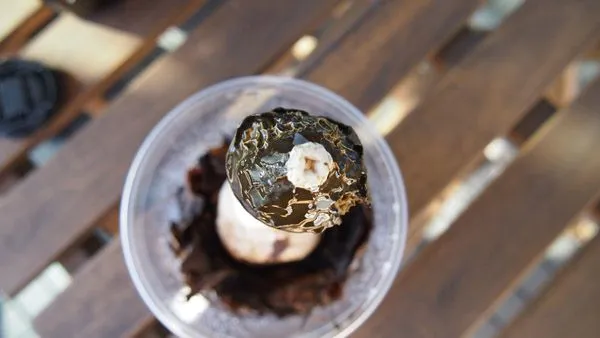
The mature fruiting body was around 15 cm long, with a cap covered in a smelly, olive-brown slime.
The stem looked hollow, porous, and quite fragile. And it had a short skirt hanging from the cap that kept slowly growing as the mushroom aged.
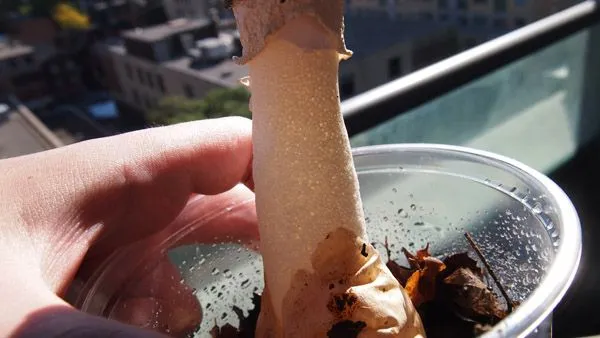
And now to the fun part. After a couple of hours, my balcony smelled like rotten meat, and it was full of flies. Big ones. And they were having a blast with the mushroom.
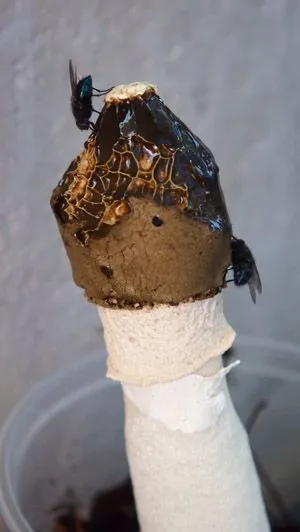
I kept watering the bad boy and the flies kept coming to my balcony until they ate all the slime, leaving a whitish surface underneath exposed.
Stinkhorns are amazing. These mushrooms have a peculiar and ingenious way of spreading their spores. The foul-smelling slime covering the cap attracts flies and other insects, who after landing on it believing it's some sort of dead animal, eat the spore-rich slime and disperse the spores.
My neighbours will be happy to see some Stinkhorns growing in their gardens in the future.
Finally, after checking all its features, it was clear that this was a Phallus duplicatus, aka the “Netted Stinkhorn” or "Skirted Stinkhorn".
Now, for those of you who are interested in etymology, like me:
Phallus should be an obvious one and it refers to the phallic shape of the mature fruiting bodies. This genus name comes from Latin phallus, itself borrowed from Greek φαλλός which ultimately comes from the Proto-Indo-European root *bʰel- meaning "to inflate, swell".
duplicatus comes from Latin root duplic-, and it means double or duplicate. According to "A Mushroom Word Guide" by Robert M. Hallock, PhD, Phallus duplicatus would mean something like "double penises" and it might refer to its characteristic skirt. Weird.
Phallus duplicatus is a member of the Gasteromycetes (stomach fungi). Gasteromycetes are fungi in which the spore bearing structures (hymenium) are exposed after the spore mature, in contrast to Hymenomycetes, in which the hymenium is exposed before the spores mature (this group includes most mushrooms, polypores, and jelly fungi). There are two other classes of fungi, Urediniomycetes and Ustilaginomycetes, but they don't produce macroscopic fruiting bodies and they're not of interest for the purpose of this article.
Phallus duplicatus is one of my favorite mushroom finds. It's so strange-looking and beautiful, and when you find mature specimens, you can actually smell then before you find them. Isn't that cool?
Disclaimer: All images are OC
Further reads:
- Phallus duplicatus at Mushroomexpert.com
- Phallus duplicatus at Tom Volk's Fungus
- The Amateur Mycologist #19 - Phallus rubicundus - Phallus rubicundus is a close relative of Phallus duplicatus.
That’s it. I just wanted to share with you my latest find.
Let me know if the comments if you liked the article and follow me for more interesting mushroom content.

Minnowsupportproject
Proud member and supporter of the minnowsupportproject - brought to you by @aggroed, @ausbitbank, @teamsteem, and @canadian-coconut
Click the logo below to learn more

SteemSTEM
Interested in science, technology, engineering and mathematics? Then, please support @steemstem, a community-supported project aiming to increase the quality and the visibility of well-written, high-quality, STEM-related content. Just click the banner below created by @foundation to join the chat channel.
